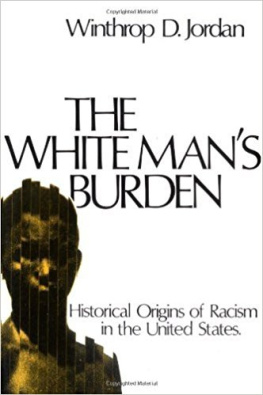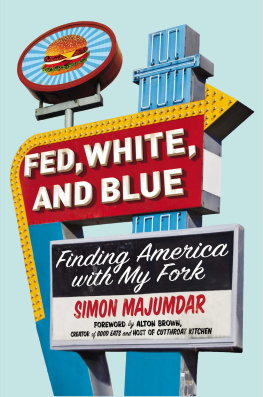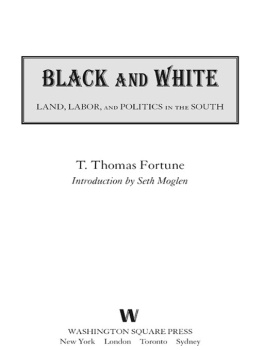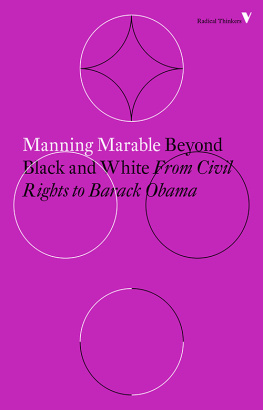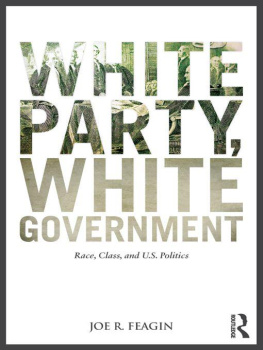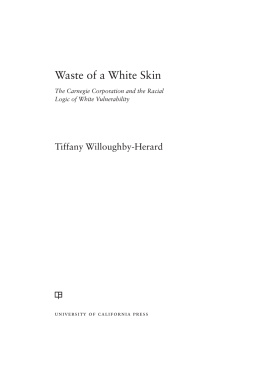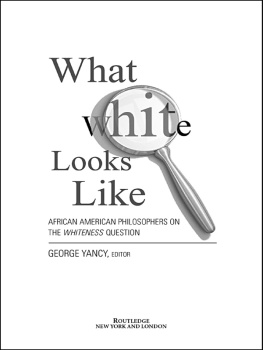The White Man's Burden
HISTORICAL ORIGINS OF RACISM
IN THE UNITED STATES
WINTHROP D. JORDAN




To Phyllis
Preface
This study deals with the historical origins of racism in the United States. I use the term racism with some reluctance, since it is very easy, and dangerous, to read present conditions into the past. Racial attitudes in this country are very different now from what they were three hundred years ago, and it is very important that we deal with our past, insofar as possible, on its own terms.
The relevance, if any, of this study to the present is left principally to the reader to determine, though I confess to having written several sentences on the subject. My assumptions about the value of historical study are similar to those of most historians. A comprehension of the past seems to have two opposite advantages in the present: it makes us aware of how different people have been in other ages and accordingly enlarges our awareness of the possibilities of human experience, and at the same time it impresses upon us those tendencies in human beings which have not changed and which accordingly are unlikely to, at least in the immediate future. Viewed from a slightly different vantage point, an understanding of the history of our own culture gives some inkling of the categories of possibilities within which for the time being we are born to live.
To say this is, I suppose, to make something of a claim for the value of studying current racial attitudes by taking, as they say, "the historical approach." What an historian contributes, inevitably, is a sense and appreciation of the important effectperhaps even the great weight-of prior upon ensuing experience.
A word about the provenance of this book. It is a quite drastic abridgement with minor modifications of my White Over Black: American Attitudes toward the Negro, 1550-1812 (Chapel Hill: University of North Carolina Press, 1968). Since publication of that work, it has become apparent, not altogether to my astonishment, that marry people do not find themselves entirely comfortable wading through six hundred and fifty pages on a single subject. It has become obvious, too, that many college and school instructors are insufficiently merciless when contemplating inflicting a book of that length upon their students. In addition, I will admit to having something of a missionary urge about the subject with which this hook deals. The White Man's Burden results from these factors.
It may appear rather a large claim to say that a book concerning attitudes toward Negroes is also a book about the origins of American racism. Let me say two things by way of explanation. First of all, when I began work on what became White Over Block I started by analyzing white American attitudes toward blacks and Indians. It soon became obvious, as I then thought, that I could not attempt both, so I dropped Indians. But in continuing with attitudes toward Negroes, Indians kept creeping (to use the prevailing stereotype) back in. So in fact there is considerable discussion about attitudes toward Indians in this book. Secondly, I remain convinced that white American attitudes toward blacks have done a great deal to shape and condition American responses to other racial minorities. To prove this contention would require another book, a project which lassitude leads me to leave generously to someone else.
Some, but by no means all, readers schooled in the behavioral sciences will discover a disgraceful lack of system in the approach taken here toward the way societies are held together and toward the way men think, act, and feel. There is, however, a certain sloppiness in the available evidence. If it were possible to poll the inhabitants of Virginia concerning their reactions to those famous first "twenty Negars" who arrived in 16td 1 would be among the first at the foot of the gangplank, questionnaire in hand. Lacking this opportunity, I have operated with certain working assumptions which some readers will detect as drawing upon some "psychologies"-the assumptions about how people operate-of the twentieth century and upon some of the psychological imagery of the eighteenth. I have taken "attitudes" to be discrete entities susceptible of historical analysis. This term seems to me to possess a desirable combination of precision and em- braciveness. It suggests thoughts and feelings (as opposed to actions) directed toward some specific object (as opposed to generalized faiths and beliefs). At the same time it suggests a wide range in consciousness, intensity, and saliency in the response to the object. We are all aware that our "attitude toward" sex is not of precisely the same order as our "attitude toward" Medicare, and the same may be said of our attitudes toward the neighbor's cat or Red China or acid-rock or the Ku Klux Klan-not, of course, that it is right to suppose that our various attitudes toward these objects are altogether unconnected with another. This book treats attitudes as existing not only at various levels of intensity but at various levels of consciousness and unconsciousness; it is written on the assumption that there is no clear dividing line between "thought" and "feeling," between conscious and unconscious mental processes. The book therefore deals with "attitudes" toward blacks and Indians which range from highly articulated ideas about the church or natural rights or the structure of the human skin, through off-hand notions and traditional beliefs about climate or savages or the duties of Christian ministers, through myths about Africa or Noah or the properties of chimpanzees, down to expressions of the most profound human urgesto the coded languages of our strivings for death and life and selfidentification.
To deal with the roots of American racism in this way is not to ignore the crucial matters of economic exploitation and social degradation. Without those factors we would have no racism as we know it. But to say, as many have done, that racism is merely the rationalizing ideology of the oppressor, is to advance a grievous error. To rest the analysis there is to close one's eyes to the complexity of human oppression.
NOTE ON THE CONCEPT OF RACE
Since the presently difficult terms race and racial are used throughout this book, it seems desirable that their meaning be clear. It is notorious that race has been defined in a great variety of (usually unfortunate) was, but it is less widely known that in recent years race as a scientific concept has undergone a virtual revolution. Since about 1950 scientists have made notable advances in the study of human races and have dispelled much confusion on the subject. Though there remain broad areas of disagreement and many unanswered questions, most reputable investigators now share certain fundamental suppositions and modes of approach.
Increasingly the tendency has been to study human races within the context of human evolution and genetics. At first some scientists directed their attention to physical features which seemed obviously susceptible to modification by natural selection. Attempts were made to link the more gross and obvious physiognomic characteristics with climate factors: thus the typical Mongolian face and stature were declared admirably adapted to extreme cold. Partly because such characteristics are difficult to analyze genetically, other scientists set out to investigate certain characteristics, such as blood types, which are governed not by many genes but by one. Initially it was supposed that blood types of the major series A-B-O were selectively neutral (that is, that individuals were neither advantaged nor disadvantaged by having a given type of blood); but it now seems almost certain that some of these types are connected with susceptibility to certain diseases. More strikingly, it has been established that a gene responsible for sickle-cell hemoglobin (which is especially common in Africa) often causes fatal anemia in those individuals with two parents contributing the gene but affords protection against malaria to individuals inheriting the sickle-cell gene from one parent only and who do not develop the anemia. In malarial areas the frequency of the gene remains roughly constant in the population as a whole: for while the sickling gene makes for a fatal disease in some persons, it saves others from death by malaria but itself does no harm, and it is thereby passed on to the next generation. In non-malarial areas, of course, the gene is entirely disadvantageous. Discovery of these facts has served to highlight man's plasticity under pressure of environmental change: elimination of mosquitoes may result eventually in elimination of a racial characteristic.

